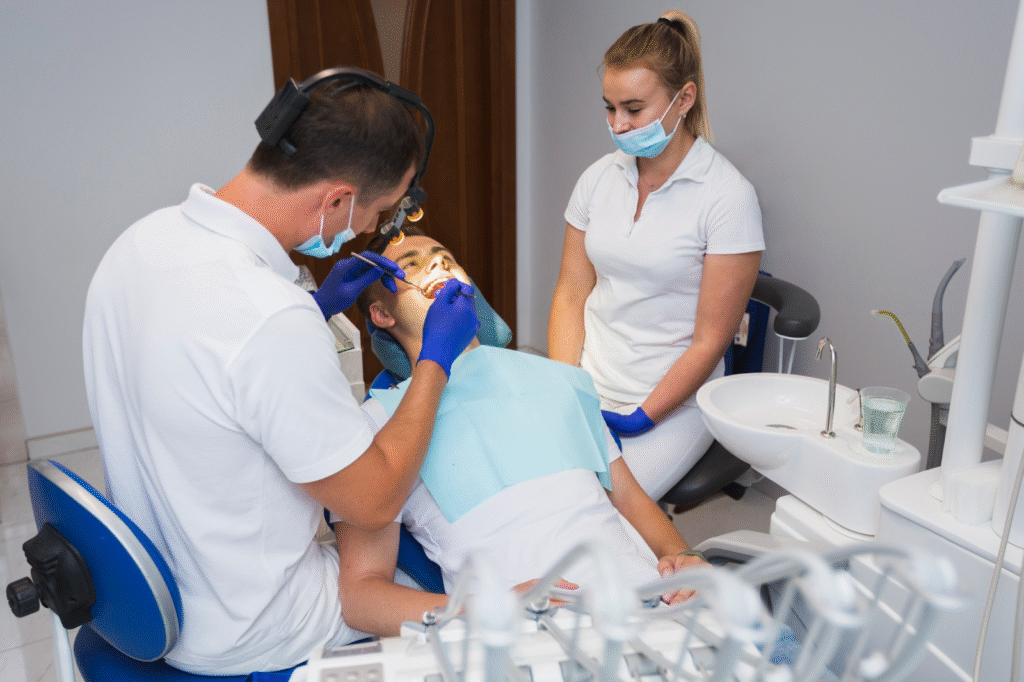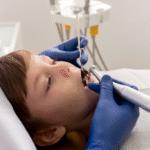Saturday - Wednesday: 9 AM - 10 PM
Thursday: 9 AM - 9 PM
Friday: Closed

July 22, 2025
What Are The Early Signs Of Dental Caries And How Can You Spot Them?
Tooth decay is one of the most common oral health issues faced by people of all ages. Left untreated, it can lead to discomfort, sensitivity, and even serious dental infections. But the good news is, if spotted early, it is completely manageable. In this blog, we will walk you through the early signs of dental caries, what causes it, how to identify it at home, and when to seek professional help. Whether you are experiencing mild sensitivity or simply want to understand more about your oral health, this guide by Diamond Dental is a good place to begin.
What Is Dental Caries?
Dental caries refers to the process of tooth decay that occurs when harmful bacteria in your mouth produce acids that break down the enamel. This often starts slowly and painlessly, making it easy to overlook. Over time, the damage can spread deeper into the tooth, affecting the dentin and even the root. Cavities typically develop when plaque builds up due to poor brushing, sugary diets, or skipped dental visits. While the early stages may go unnoticed, understanding how caries begin can help you stay ahead of serious damage. It is a condition that can be easily managed with timely care and attention.
Why Early Detection Is Important
Catching the signs of dental caries treatment early can make a huge difference in preserving your natural teeth. At the initial stage, tooth decay can often be reversed or managed with simple procedures like fluoride treatments or minor fillings. However, if ignored, the decay can reach the deeper layers of the tooth, leading to infections, root canal treatments, or even tooth loss. Early detection also helps reduce discomfort, saves time, and lowers the cost of treatment. Regular dental check-ups and being aware of the warning signs ensure that problems are addressed before they escalate into something more serious.
Common Early Signs of Dental Caries
Spotting the first signs of tooth decay can help you take action before it worsens. Keep an eye out for:
- White or chalky spots on the surface of the teeth – an early sign of enamel weakening
- Sensitivity to cold drinks, sweets, or while brushing
- Mild discomfort while chewing or biting down
- Bad breath that does not go away despite regular brushing
- Small brown or black spots forming on the tooth enamel
These signs may seem minor at first, but could indicate the beginning of tooth decay. If you notice any of them, it is best to consult Diamond Dental for early dental caries treatment in Kuwait.
Types of Dental Caries You Should Know
Understanding the types of dental caries can help you identify how decay might affect different parts of the tooth. Each type progresses differently and may require specific forms of treatment:
- Enamel caries: Begins on the outermost layer of the tooth and is usually painless in the early stage.
- Dentin caries: Spreads beneath the enamel into the softer layer, often causing sensitivity.
- Root caries: Affects exposed roots, more common in older adults or those with gum recession.
- Recurrent caries: Occurs around fillings or dental restorations where decay reappears.
Knowing these types gives you a clearer picture of what to look out for and when to seek help from a dental expert like Diamond Dental.
What Causes Tooth Decay?
Several daily habits and conditions can contribute to the development of tooth decay. The most common causes include:
- Poor oral hygiene – Irregular brushing or flossing leads to plaque buildup.
- Frequent snacking on sugary foods – Sugar fuels bacteria that produce decay-causing acid.
- Dry mouth – Reduced saliva limits the natural washing away of food particles and acid.
- Skipping dental visits – Problems go unnoticed and untreated.
Being aware of these factors helps you make smarter choices for long-term dental health and reduce the risk of needing extensive dental caries treatment.
How to Check for the Signs at Home
While a dentist’s examination is the most reliable way to catch decay, there are a few things you can look for at home to stay proactive:
- Use a mirror to inspect your teeth for white spots, discoloration, or small holes.
- Take note of any sensitivity when consuming hot, cold, or sweet foods.
- Check if your breath smells stale even after brushing.
- Watch for discomfort or pain while chewing certain foods.
- Feel around your teeth with your tongue for any rough or uneven areas.
These home checks are not a replacement for professional care, but they can help you identify early signs and decide if you need dental caries treatment.
When to See a Dentist
It is important not to ignore certain warning signs that suggest tooth decay may be progressing. If you experience sharp or lingering tooth pain, visible holes or black spots, or ongoing sensitivity to hot or cold food, it is time to see a dentist. Swelling in the gums or persistent bad breath can also point to deeper issues that need professional care. Do not wait for the discomfort to become unbearable. Early diagnosis makes dental caries treatment simpler, more affordable, and less invasive at Diamond Dental. A timely visit to your dentist can help stop further damage and save your natural tooth.
Tips to Prevent Dental Caries Early
Preventing tooth decay starts with simple, consistent habits. Brush your teeth twice a day using a fluoride toothpaste, and make sure to floss daily to remove plaque between teeth. Limit sugary snacks and drinks, especially between meals, as they feed harmful bacteria. Drinking plenty of water also helps wash away food particles and acids. Most importantly, visit your dentist every six months for a routine check-up and cleaning. These small steps go a long way in protecting your teeth from decay and reducing the need for dental caries treatment. Prevention is easier and far less painful than a cure.
Conclusion
Spotting the early signs of tooth decay can make all the difference in preserving your smile. From white spots to tooth sensitivity, being aware of these changes helps you act before the damage becomes serious. Understanding the types of dental caries and what causes them puts you in a better position to take control of your oral health. If you are unsure about any symptoms, it is always best to consult a professional. At Diamond Dental, our experienced team of doctors is here to help you with expert care, early detection, and personalized treatment solutions tailored to your needs.
Search
Recent Posts
-
Top 10 Benefits of Dental Implants
19, Aug, 2025
-
What Is Tooth Decay? Causes, Symptoms, and Prevention
19, Aug, 2025
Looking for professionals & trusted medical healthcare?
Don't hesitate to contact us.

Contact Us
Get In Touch With Us
© 2024 All Right Reserved














